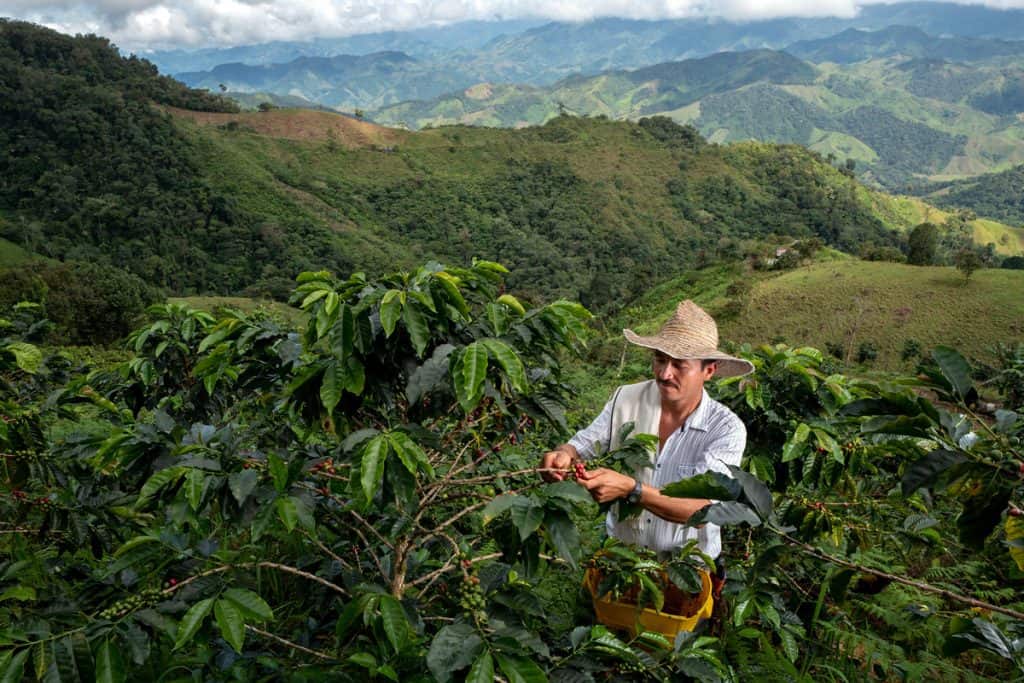This impact story was originally published here.
Deforestation continues to be a pressing global issue, and Colombia has been significantly affected by this environmental crisis. In response, the Rainforest Alliance, in collaboration with various partners and with the support of USAID, has launched an initiative called “The Business Case for Collective Landscape Action.” This groundbreaking program aims to combat deforestation in Colombia, particularly in the Caquetá region, by adopting a comprehensive landscape approach. By addressing the root causes of deforestation and promoting sustainable practices, this initiative seeks to reduce greenhouse gas emissions, preserve biodiversity, and improve the livelihoods of local communities.
The Challenge of Deforestation in Colombia:
Colombia has faced alarming levels of deforestation in recent years. According to the Forest and Carbon Monitoring System (SMByC) of Colombia’s Institute of Hydrology, Meteorology, and Environmental Studies (IDEAM), the country lost 171,685 hectares of forest in 2020 alone. Caquetá, one of Colombia’s departments, has experienced a particularly high rate of deforestation, accounting for approximately 25% of the total area with changes in natural forest land use between 2017 and 2018.
The Integrated Landscape Approach:
To effectively address deforestation, it is crucial to adopt an integrated landscape approach. A landscape is a complex system that encompasses ecological, historical, economic, and socio-cultural factors. By implementing integrated landscape management strategies, we can optimize the use of natural resources within a specific area while considering the needs and contributions of all stakeholders involved.
The Role of the Business Case:
The Business Case initiative, already successful in Peru, Ecuador, Brazil, and Indonesia, has expanded its reach to Colombia, spearheaded by the Rainforest Alliance. The primary objective of this initiative is to combat deforestation caused by commodity production through a landscape approach. By working collaboratively with stakeholders, the Business Case seeks to reduce greenhouse gas emissions, conserve biodiversity, attract sustainable investments, and enhance the overall management of the territory.
Building an Alliance for Change:
The launch of the Business Case initiative in Caquetá brought together key stakeholders, including representatives from the local government, producers of coffee, cocoa, rubber, and panela, as well as various associations and cooperatives. International organizations such as Conservation International and CDP also participated, demonstrating a shared commitment to combat deforestation in Colombia. Over 150 people attended the event in person, with an additional thirty joining virtually.
The Importance of Collaboration:
During the event, representatives emphasized the importance of collaboration in addressing deforestation and promoting sustainable production models. The comprehensive landscape approach of the Business Case aligns with the goals of the local government of Caquetá, which aims to restore territories and generate incentives for conservation. Additionally, the initiative received praise from Jessica Rosen, Director of USAID Colombia’s Office of Sustainable Ecosystems and Economic Development, who highlighted the critical role it plays in reducing greenhouse gas emissions derived from deforestation.
The Road Ahead:
With its focus on developing Landscape Action Plans, the Business Case aims to address deforestation, unsustainable practices, biodiversity loss, and low productivity in crops. By attracting long-term investments aligned with the department’s priorities, this initiative seeks to create a sustainable future for Caquetá. The launch event provided an opportunity for attendees to support local producers by tasting and purchasing their products, contributing to the economic well-being of the producing families.
The Business Case initiative represents a significant step forward in the fight against deforestation in Colombia. By adopting an integrated landscape approach and engaging stakeholders from all sectors, this collaborative effort aims to reduce deforestation, mitigate climate change, and improve the quality of life for local communities. The launch event in Caquetá showcased the commitment and enthusiasm of all those involved,highlighting the potential for positive change and sustainable development in the region. With ongoing support and collective action, the Business Case initiative holds the promise of a brighter, greener future for Colombia, where economic growth and environmental conservation go hand in hand.
